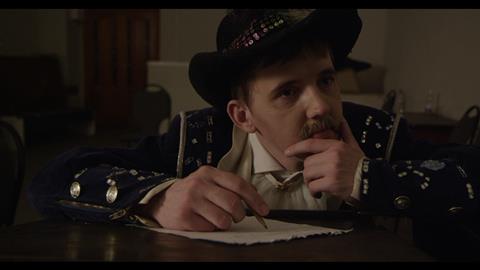Dir. Jerzy Sladkowski. Sweden/Finland, 2015. 92 mins.

Don Juan is an unusual, perceptive, slightly off-beat film which looks at how we see and react to mental illness without ever really hectoring the viewer – although, frankly, there’s quite enough yelling on screen as blousy Marina, single mother of 22-year-old Oleg, tries to get her autistic son to have a “complete” life in Nizhny Novgorod. This sensitive piece of documentary film-making, which competes at IDFA, seems destined for wide festival play and select arthouse distribution thanks to Jerzy Sladowski’s kind camera and Oleg’s generosity and shy, open heart.
Marina engages every quack in town including a hilariously aggressive therapist called Sveta who slaps Oleg around the room and insists the terrified boy ride her like a donkey
Don Juan is quite unique; peopled by a cast of increasingly odd, gargoyle-like characters led by Marina, who will stop at nothing to get ‘professional’ psychiatric help for her ‘lazy’ son, a student of economics at the University of Nizhny Novgorod - but, in her eyes, a beloved loafer who is draining her of energy and money.
In pursuit of her goal, Marina engages every quack in town including a hilariously aggressive therapist called Sveta who slaps Oleg around the room and insists the terrified boy rides her like a donkey. There’s a portly, track-suited elderly gent called The Colonel who tells Oleg that “In Russia, you can touch what you want – girls like persistence and pushiness”. A psychiatrist holds out no hope for Oleg whatsoever and even Marina calls him useless and threatens to ‘call the looney bin’.
“Everything about you is repulsive,” she adds, for good measure, although we are in no doubt that Marina loves Oleg and that his progress thus far is probably due to her unstinting efforts. The problem is – when will she stop and let go?
Oleg’s sharp-tongued Russian-doll-shaped grandmother is a small voice of reason when she warns Marina to back away: “All you do is dwell on hope,” she says, dourly. In reality, though, Oleg is the sanest presence in this strange world of adults who think they know what is best for him. “I don’t know how to solve life’s problems,” he admits. And Oleg is a trier; even when Marina pushes him into a strange theatre troupe of beautiful, giggling, corseted performers who will “give him confidence”, he gives it his best shot. The sequence where he haltingly begins to dance is so touching and vulnerable, it’s hard to keep watching the screen.
Just when it’s looking hopeless for Oleg’s life ambition of having friends and being happy – of losing the terror of himself which prevents him from physically reaching out to another human being - Sladowski holds out hope of redemption. But is this real or is theatrical smoke and mirrors? Sladowski wants the viewer to decide but and we, like Oleg, are scared to believe.
Sladowski, working with DoP Wojciech Staron, is a fine technician; sound and editing flesh out some perceptive, occasionally beautiful lenswork. Music is sensitive. Oleg holds himself tight – he barely moves his mouth when he speaks. But inside, he’s open, and his full heart and generosity have given Sladowski – and viewers – a special film to think about.
Production companies: Ginestra Film/Antonio Russo Merrenka
International sales: www.catndocs.com
Cine: Wojciech Staron
Editors: Agnieszka Borjanowska, Jakub Sladowski
Music: Timo Hietala






![The Brightest SunScreen[Courtesy HKIFF]](https://d1nslcd7m2225b.cloudfront.net/Pictures/274x183/3/5/0/1448350_thebrightestsunscreencourtesyhkiff_312678.jpg)















![The Brightest SunScreen[Courtesy HKIFF]](https://d1nslcd7m2225b.cloudfront.net/Pictures/100x67/3/5/0/1448350_thebrightestsunscreencourtesyhkiff_312678.jpg)

